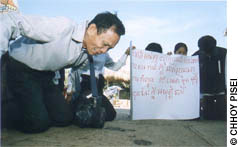

rene.jpg
UMC members protest the court order stripping the church body of possession of its headquarters in Phnom Penh.
Along-running land battle between the United Methodist Church (UMC) and a former
employee came to a head on January 2 when armed police entered the Phnom Penh compound
and evicted the Methodists.
Pitou Lao, a former UMC missionary who claims he still represents the organization,
arrived at the church's headquarters accompanied by approximately 20 police and an
entourage of supporters. The property has been the subject of a legal feud since
1999.
The move followed a decision last month by the President of the Supreme Court, Dith
Munthy, who sent UMC a letter demanding it hand the property over to Lao. That was
despite the fact that Lao used $250,000 of church money to buy the property in 1998.
Michael Collins, UMC's country director, said the court had not given the organization
a fair hearing.
"On December 20, 2002 [Dith Munthy] said we must hand over the property to Lao,"
said Collins, who is also a church minister. "Lao has no more authority to work
with us. He paid no money for this property. The only person with the authority to
make the decisions is myself ... All I'm doing now is asking for justice."
He said he felt angered and let down by both the Cambodian legal system and God Himself.
"When I see the decision by the Supreme Court, [I ask], why do the wicked prosper?
Why are they not swiftly struck down for punishment?" Collins said.
The legal dispute began in 1998 when Lao and fellow missionary Joseph Chan bought
the property with UMC funds. But after allegations of misconduct, which Lao denies,
he was forced to leave UMC in 1999.
The church then went to the Phnom Penh Municipal Court to get permission to change
the legal representative of the property. The court ruled in favor of UMC, a decision
Lao then appealed.
Collins said the UMC requested that the Appeal Court delay the hearing, but it went
ahead regardless and without the UMC attorney present. The court ruled in favor of
Lao, and then turned down UMC's plea for the case to be re-heard.
Then after the Supreme Court agreed to hear UMC's appeal, the organization received
the letter from Dith Munthy. Collins said the case had not been heard by the Supreme
Court, and vowed to pursue it vigorously.
However Pitou Lao told the Post that the documents detailing his leaving UMC and
relinquishing the property rights were forged.
"I do not remember signing this," he said when shown a document purportedly
bearing his signature and thumbprint handing over the property rights to UMC.
The result, said Lao, was that he still belonged to UMC, and consequently was the
rightful owner of the land. He said the building would still be used as a Methodist
church, and he was fighting to use UMC's name.
"This is the rule of the ... government," he said. "We are just executing
the document of the court."
Michael Keller, the economic and commercial officer at the US Embassy, said the outcome
was a bleak indicator for foreign investors, who are barred from owning more than
a 49 percent stake in a piece of property.
"This is not a shining example of the Cambodian legal system," said Keller.
"This is one example we can give to foreign investors."
The Post was unable to reach either Dith Munthy or his deputy for comment.
Contact PhnomPenh Post for full article
Post Media Co LtdThe Elements Condominium, Level 7
Hun Sen Boulevard
Phum Tuol Roka III
Sangkat Chak Angre Krom, Khan Meanchey
12353 Phnom Penh
Cambodia
Telegram: 092 555 741
Email: [email protected]





